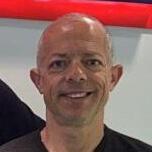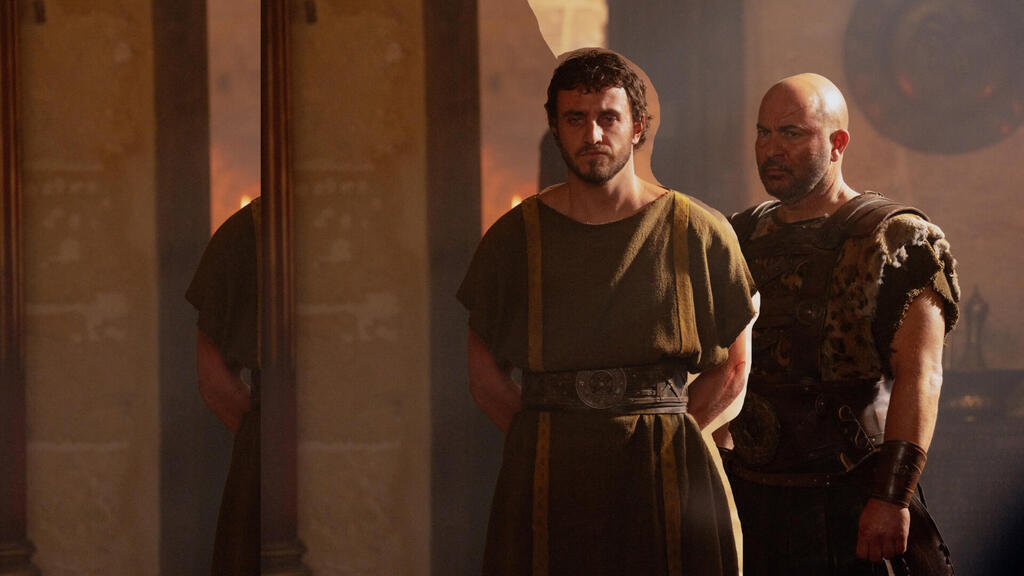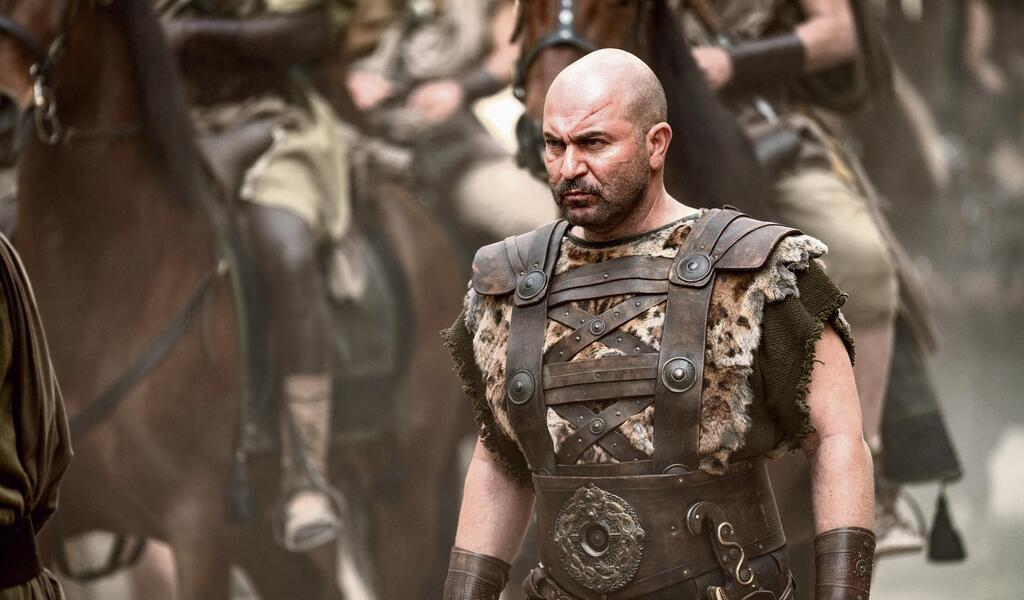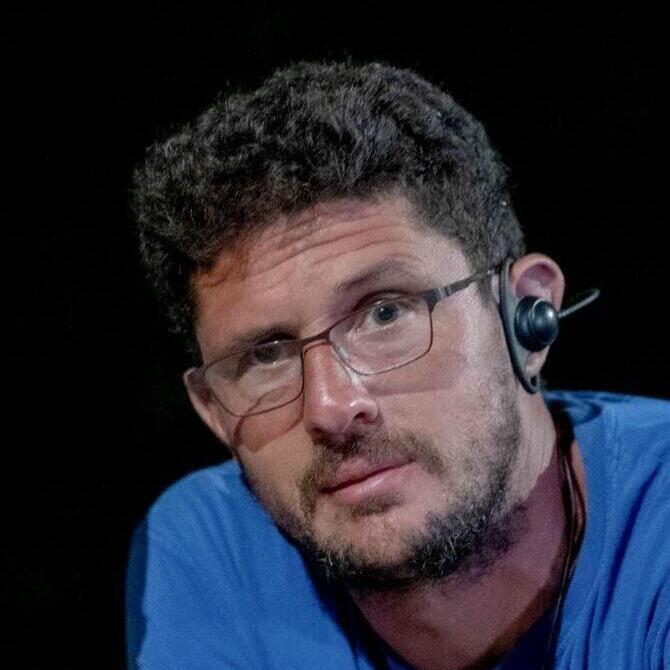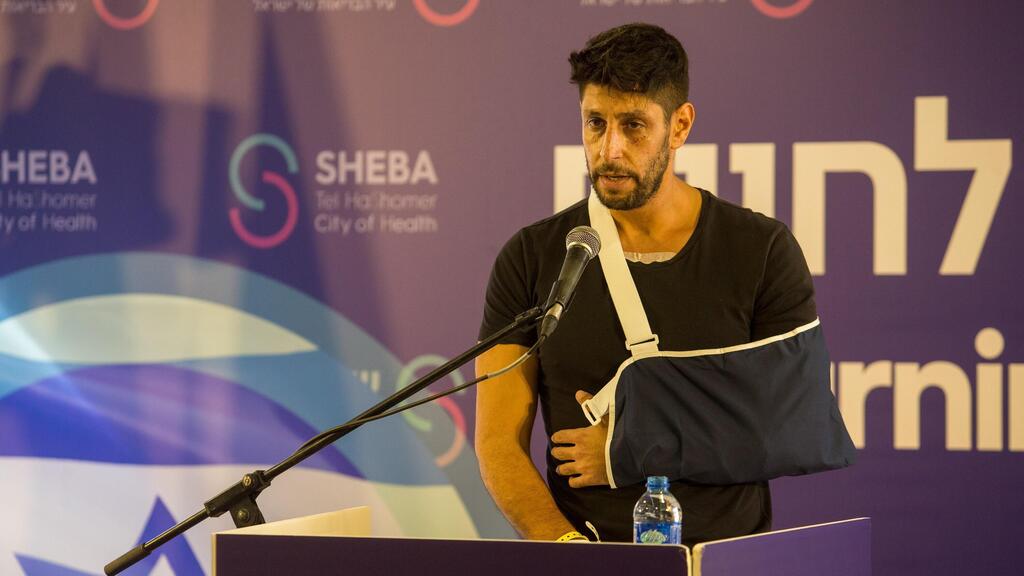Getting your Trinity Audio player ready...
As a child who had a complex childhood, living in the city of Ma'ale Adumim near Jerusalem, Lior Raz thought there was a limit to what he could dream. Nowadays he is having dinner with Dustin Hoffman, chats with Ridley Scott about "Fauda" and shares scenes with Denzel Washington. Israeli star Lior Raz, who is featured in "Gladiator II", talks about the security guards who escort him on his visits to Europe and why he is urged to share his thoughts on current issues on social media
I was ready to just serve coffee for a chance to be on the set of director Ridley Scott
"I was offered the role in 'Gladiator II' on a phone call by my agents in the U.S. without an audition. It is called 'offer only'".
In Israel, it rarely happens to you.
"Funny that in Israel I go to auditions, and abroad I don't", he laughs. "But to be exact, in Israel it works differently; it's not really an audition that I do, they want to do a match, to test how you fit with other actors. In the U.S. and in other countries, once you reach a certain stature, they usually don't ask you to do an audition. That was the case in the films that I did recently, including the last one with Dustin Hoffman".
It's quite amazing to reach such a star level.
"Hmm, that's right. And then they said: Ridley Scott, who directs 'Gladiator II', is interested in speaking to you himself".
Are you Scott's fan or an occasional viewer?
"Ridley Scott is my favorite director, and I love his movies from "Black Hawk Down" to "Blade Runner"; I never dreamed of being able to work with him because even dreams have limits. I never thought I would ever work with Ridley Scott. I can tell you about every scene and frame of "Black Hawk Down", one of the best action movies ever made. Scenes from “Black Hawk Down” even inspired some of my writing and directing work on “Fauda”, the realistic fight scenes, the emotions in those fights and the character building. In any case, following that phone conversation, a Zoom meeting was scheduled with Ridley Scott."
Did you prepare in advance for this Zoom meeting in any special way?
"No. Nothing special. It's a conversation between a director and an actor. I wanted to ask things, and he had things to ask."
I assume he watched 'Fauda'.
"Yes, otherwise he wouldn't have offered me the role. He said he had a small role for me and felt a little uncomfortable offering it because it was too small for me.
But I told him straight away, 'Ridley, I would be happy to just appear passing by in a frame just to work with you, I don't care'." Scott replied: 'I'll send you the script for your approval, if you're interested'. I said: 'Do you want me in your movie? I'm in. No doubt about it, I don't need to read the script. I'm ready to bring you coffee, just to be on set with you and see how you work'." It's really not a big role. You see me there, but it's not one of the longest appearances in the movie."
I'm not sure that the number of minutes is what counts when it comes to a movie franchise like this.
"The movie itself is bigger, but my role is small. I'm not the main gladiator character. Maybe next time I'll get a bigger role, but it's definitely being a part of a huge brand. Everyone goes to see 'Gladiator II,' I've seen the previous movie five times. Having Ridley Scott direct also the sequel, is a dream come true."
The set of 'Gladiator II' had the highest testosterone concentration I've ever seen
"On the first day of filming 'Gladiator II,' when I arrived on set in Malta, Ridley asked to meet me in the trailer. I was expecting to talk to him about my character in the movie, or maybe ask him some questions about “Black Hawk Down.” Instead, we sat for 30 minutes in the trailer, and he analyzed “Fauda”, from specific scenes to relationships, talking about the characters of 'Shirin' and Raz’s 'Doron'. I was amazed by how much he knew about the series."
Did he ask about your 'Fauda' co-star Idan Amedi after he was seriously injured fighting in Gaza? I'm not sure there are too many precedents for actors who were also injured in action.
"It happened at the end of our filming in Malta. I was scheduled for the last two days of filming and suddenly got a call that Idan was injured. Everyone started calling me. I felt helpless, overwhelmed with stress and grief, and the only thing I wanted to do was to return to Israel and be there with Idan. I called the production, told them that Idan was injured and asked them to cancel the last two days of filming. The next day I took a flight to Israel and rushed to the hospital. I even managed to get back to Malta for the shooting of the last scene I was supposed to film, so everyone on the set knew about Idan and expressed their concern."
What can you say about your character in 'Gladiator II'?
"I'm playing the character Vigo who is tasked to train Denzel Washington and other young gladiators. Vigo has no known origin. They didn't cast me because I was Israeli, but because they thought I was fit for the role."
Absolutely. Enough with corpses for you.
"In 'Gladiator', everyone is dead too. But in recent years, in my latest projects, we've done more interesting things than just playing a corpse. Look, it's a crazy set, a very expensive film, hundreds of extras, the set with the highest testosterone concentration I've ever seen in my life. They're all bodybuilders, they look huge, they walk around half-naked, they do push-ups and fight with each other all day. I'm playing a retired gladiator, someone who has broken free from being a gladiator and winning championships, I look at them and say: How could I beat people like that, me being so short, so small."
You train four hours a day for a one-and-a-half-minute fight. It can be very painful.
"The working methods on the set of Ridley Scott basically mean that on the days you're not filming, you have to train very hard on the fight choreography. You have to keep super fit, refrain from getting injured, and literally practice three to four hours every day, for a one-and-a-half-minute fight scene in the film. You really have to become a pro. This was a very difficult task, which I really enjoyed. It's like working on a dance moves, only here you're getting punched while moving."
Does it hurt?
"I was injured a few times, I broke two ribs, I tore a muscle in my leg, I pulled a tendon. It happened quite a bit. There are many professional fighters on the set, but they sometimes beat people up by mistake, when they happen to forget the choreography steps, everything is moving very fast. In 'Hit and Run' my co-actor hit my ribs with his knee, and I broke a rib."
Did he apologize?
"Of course he did, but I didn't forgive him. He's a very good person, my best friend. It can happen. I also accidentally punched someone who was older than me, and I felt very bad about it. I carried this horrible feeling within me for weeks. It happened in 'Fauda', someone moved my car seat, I didn't notice, and while planning how to point my hand, my fist suddenly reached him. It hurt him a lot."
At least you didn't get punched by Denzel Washington. What impressions did you get in general?
"I was awed watching Denzel Washington playing, how he delivered the texts, how he did his monologues, I was amazed by his versatility, he can take the text and play with it in a different way. He is inspirational, a role-model for acting. Paul Mescal who plays the character of the main Gladiator is a cute guy. We hung out and spent quite a bit of time together. He is a young and amazing actor. I watched him act in "Normal People" and fell in love with him there. Also, Pedro Pascal turned out to be a charming person, although I didn’t get to work with him, on our occasional interaction on the set I sensed that he was a nice person, someone who asks questions and is genuinely interested in what you're saying. I also admire him from 'Narcos'".
When Netflix wanted to buy 'Fauda' I didn't understand why
"A week ago I had dinner with Dustin Hoffman and we spent an amazing evening together. We were four or five of us, together with his wife and the director. Dustin Hoffman is also a 'Fauda' fan. He told me that in the first three scenes he thought it was a documentary and gave me a lot of compliments which I will not mention here.
We're currently filming the movie "Tuner" together. It tells the story of a piano tuner who finds himself, along with me, in a crazy swirl in New York's crime world. I play the character of a guy named Uri, an Israeli who relocated to the United States; it is a fun and complex character that I really enjoy playing. The director is Daniel Rohr (who won the Oscar two years ago for the documentary 'Navalny'). Leo Woodall plays the lead role, and Dustin Hoffman stars."
The dreamy boy from Jerusalem shares a set with one of the greatest actors in the history of cinema. Does that pass through your mind?
"Of course. I grew up in the city of Ma'ale Adumim near Jerusalem, in a very complex home, with divorced parents. The odds were against me. I received an amazing education, but reaching the status of who I am today is simply mind-blowing for me."
How do you deal with it?
"I could say, 'That's life, it's amazing, I'm very proud of myself.' But that's not who I am. Yesterday I said to myself that I should write down ten things I needed to be thankful for. Who dreamed, when I was studying in Nissan Nativ Acting Studio in Jerusalem that I'd make it big? After all, even dreams have a glass ceiling, and even in your wildest dreams you say: There's a limit to what one could dream - and my limit was to be a successful actor in Israel, to play in a theater, in a TV series maybe. That was my wildest dream. I didn't grasp that dreams could be much bigger."
Because no one predicted that 'Fauda' would set a precedent on Netflix.
"When 'Fauda' came out, it was unusual for a Hebrew series to be successful worldwide in its original version. When Netflix wanted to buy 'Fauda', I thought it was strange because my dream was that they would do a remake in English, like Homeland. I didn't understand why they wanted an Israeli series that spoke Hebrew and Arabic to be screened in Brazil or India. But unexpectedly the series made international headlines and everywhere I go, people stop us on the street asking to talk to us. A few days ago, I spent time with Fauda's co-star Tomer Capone, who was also filming in Canada, and people around us kept asking us about 'Fauda'."
6 View gallery
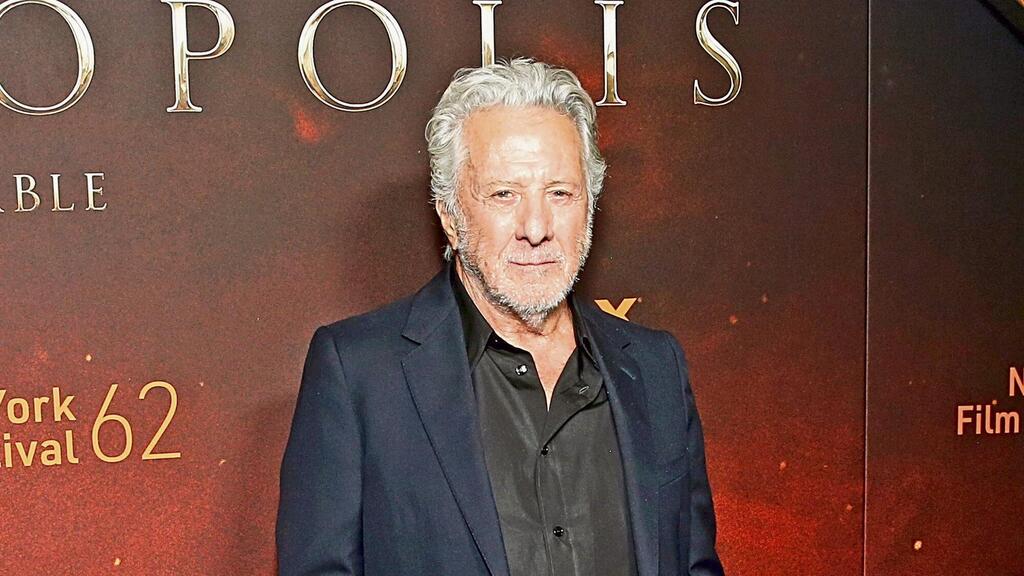

Dustin Hoffman. "He thought Fauda was a documentary"
(Photo: Dominik Bindl/WireImage/GettyImages)
Tomer Capone's role in Fauda didn't last long. It's quite a missed opportunity.
"When you write a script where a certain character dies, you don't always know who would be the actor - but I think Tomer benefited from 'Fauda', and from there on his great talent already leveraged him. He stars in the fourth season of 'The Boys' streamed on Amazon, he is a big star."
The Gaza war was discussed on the set of 'Gladiator'
"During filming, October 7 happened and of course everybody was very curious about what was happening in Israel, asking how my family was doing, and if everyone was okay. Look, war is an intriguing matter, but on the other hand, I know that it's often difficult for people to ask about it. Ridley Scott also talked to me about the war, which was part of the conversation on the set."
Were there any questions or statements that surprised you?
"No. It's clear-cut, they massacred us, slaughtered us, raped us, kidnapped us - and we went to fight them back. I didn't feel like I had to explain too much then, the situation was obvious to me, unequivocal, no doubts involved. That's what I explained to anyone who asked me about the war. Israel was under attack, our homes were infiltrated, we were raped, murdered, and kidnapped, including small children. Any normal country would have responded in the same way. I was very steadfast in my opinions, and still am, when I talk to people worldwide."
Since the war, have you received less positive reactions in the world?
"No. I spent some time in New York recently, I stood near places where posters of kidnapped Israelis had been torn down once. I stood there waiting to see if someone would do it, to confront them, but there was nobody. I never received a threat message. There are places in the world where I go with security, when people know I'm supposed to participate in a certain event."
Why?
"I'm a well-known person, a lot of people approach me and I can never know who and what I will have to deal with, especially in Europe, where there's a lot of antisemitism. When people know that I'm supposed to be someplace, I'm always escorted by security."
Is it because of the war, or it's been always the routine?
"Always. They know I'm Israeli, that I served in an IDF elite unit. I refrain from getting myself into trouble."
Do you feel things have worsened?
"As an actor, I don't feel that. As a creator, Avi Issacharoff (Fauda creator) and I often understand when we get responses like, 'Let's stop, let’s wait a few months to see what happens with the project'. On the other hand, we have many projects that are still ongoing abroad, scripts and productions that are getting underway."
Threats from the Arab world? I received curses specifically from Israelis
"Good things are also happening in the international industry. We meet Jewish producers and wealthy people who want to contribute and make the Israeli voice heard through content, to show who we are, not necessarily through militant things. Before the war, there was an article in the Egyptian newspaper 'Al Dostour', according to which Avi and I changed the perspective of young Arabs on young Israelis through 'Fauda', and also through 'Hit and Run'. In other words, content can change perceptions. That's quite a lot."
What perception was changed?
"Basically, the article says that until today Arabs were educated to look at Israelis in a certain way, and today they understand more about the complexity of Israelis, both the good and the bad in us. I see that change when I meet Arabs in my travels. There's a Lebanese guy on the set, a camera assistant, whose mother sent special Arab cookies to my home here in Canada because she loves 'Fauda.' He is my best friend on the set. It turns out that people from all over the world watched 'Fauda,' and Arabs also changed their perception about us."
6 View gallery
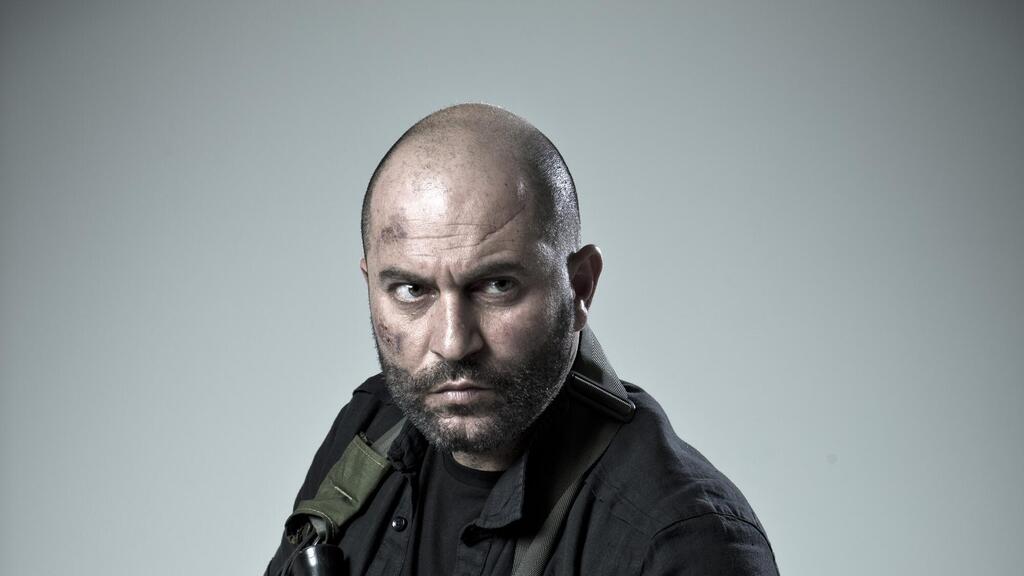

Lior Raz in Fauda. "Storyline of next season takes place two years after October 7 horror
(Photo: Ohad Romano, with Yes permission)
Israel is also being accused of over-aggression in Gaza. Maybe playing as a fighter in Fauda impairs also your image.
"We're at war against a terrorist organization that is hiding under hospitals. Every incident of a child who dies in Gaza saddens me, but we're at war. I haven't traveled to Arab countries since the beginning of the war. I get comments online of 'Free Palestine' every day."
Do you get curses, threats?
"No, no. I'd like to see someone who dares to threaten me. I didn't receive any threats, but yesterday an Israeli wrote to me that he wished I had cancer over a post I wrote about the dismissal of Defense Minister Yoav Galant in the middle of the war. I didn't comment on that, and it doesn't bother me, I wish him long life and happiness."
What bothers you the most after Gallant's dismissal?
"The inequality in sharing the burden of military service. The fact that there is an entire sector (ultra-Orthodox) in Israel that doesn't serve in the IDF nor volunteers and just asks for coalition funds over and over again. Even Netanyahu himself said it was impossible. He made an analogy of 'Fat man, Thin man' at the time, which means that it's impossible for an entire sector to carry the burden of another sector. The situation has changed, the country needs soldiers, and we are basically being spit in the face. Gallant's dismissal surrounded this issue."
They will say that the prime minister is allowed to fire a defense minister at any given moment, even during a war.
"Firing a defense minister in the middle of a war, when there's a threat from Iran, just to promote the ultra-Orthodox draft exemption bill? If it was for security reasons or due to Gallant's misfunctioning, failing to do his job, I would see no problem in firing him. Even foreign minister Gideon Sa'ar wrote at the time that it was wrong to fire a minister in the middle of a war."
You are being criticized quite a lot on social media. Maybe it would be best for you to focus on your international career?
"It would have been best to remain silent, but it's not who I am; when something's bothering me, I'm saying it. I've been writing about the ultra-Orthodox's exemption from the army for years. It's burning inside me. Why should an entire sector be assigned for reserve duty, and the other sector should not? Why should my son go to university only after completing military service, and the ultra-Orthodox should not? They can study and serve the country at the same time; no problem, as long as they are part of the country and don't disassociate themselves.
I pay a price for speaking out, I receive scornful and hate messages, like 'May you have cancer,' but I live by my truth and adhere to it. The latest political polls regarding the exemption given for the ultra-Orthodox community shows that most Israelis would like to see equality in sharing the burden of military service."
Issacharoff and you said in an interview to newspaper Yedioth Ahronoth that if film production is restricted in Israel, you won't be able to work here. It caused a stir.
"If a carpenter is told that he cannot work in carpentry in Israel unless he makes a chair in a specific manner - what would he do?' That's my answer. Many people misunderstood me, claiming that I said I would leave Isarel because of the judicial reform, but that's not what I meant. I will always stay in Israel. I will fight for my right to express my opinion here. That's the beauty of democracy.
We rejected an unrealistic script for 'Fauda' before the war because we thought it was absurd
"I sometimes hear that 'Fauda' storyline is ahead of reality. In the third season we already dealt with Israeli hostages, and even after the series aired, no one believed that two Israelis, a boy and a girl, would be abducted into Gaza. It seemed absurd that they would manage to both kidnap and cross the border with the abductees. We never imagined it could happen either; we told ourselves that it was quite an unrealistic scenario.
But October 7 was 300 times more than what we've ever imagined, the cruelty and evil of Hamas terrorists were, and still are, a million times more than we could ever imagine. We were unable, no one was able, to fathom the extent of the evil, the cruelty, the hatred and the madness that we encountered on October 7.
"When we wrote the fifth season, prior to the war, we threw around ideas. I suggested to Avi Issacharoff to write a storyline involving terrorists taking over an entire community in Judea and Samaria, abduct Israelis, and Israel is negotiating a deal for their release. Avi said it was too fictitious and could not be done. We gave up the idea.
Then October 7 happened, and it was not just one or two communities that were taken over. Hamas managed to do something horrific that surpassed all imagination. After infiltrating the communities, the terrorists stayed there all day long, while no one came for the resident's rescue, which is also inconceivable. I'll never understand how entire communities were left alone for so many hours."
Will you include October 7 in the next season of Fauda?
"The script refers to October 7 and it's very present there, but the plot takes place about two years after October 7."
According to the script, are there still hostages in Gaza?
"I can't talk about it. I really hope that in reality our hostages will return. This is another crazy thing that happened; people were kidnapped from their homes, and they still haven't been released. They are dying, murdered and tortured there, undergoing all kinds of abuse for more than a year. The Israeli ethos means that you go on rescue missions anywhere in the world, no matter what, such as Entebbe, Sabena, bringing Ethiopian Jews to Israel with 'Hercules' aircrafts. This ethos, as far as I see it, is currently crashed. We cannot bring our hostages home."
You couldn't write about the exploding pager operation.
"That's crazy, amazing. It's simply an operation beyond imagination. I take my hat off to the female officer who came up with the idea. Crazy. It brings back our national pride after we've been shuffling for so long, saying that our intelligence was lacking.
There were claims that the Arab terrorist portrayed in 'Fauda' could be seen as a good, sensitive and complex person. You even managed to make us empathize with them at times. Any regrets?
"Look, in the world of cinema you can create your enemy character as flat, lacking depth, but then the film will be boring. Abu Ahmed in the first season is caught because of his deep love for his wife. He asked her to come over and that's why he got caught. This scenario is based on a true story that happened in the Arab territories - a senior official got caught because he met his wife and bought her perfume; in other words, he was arrested because of love. When we wrote the series, we were inspired by real stories. In today's storyline we will no longer have empathy for Hamas. On the other hand, the terrorists in 'Fauda' were presented also as very cruel. Abu Ahmed murdered 116 people, terrorists murdered a girl they have kidnapped, they blew up buses. The storyline is made up from all of these things."
Fauda was indeed very successful in the Arab world
"Yes, but also in Brazil and India, in Canada and in the U.S., because everyone can relate to it. Hamas hated the series, they wrote terrible things about it, saying that the series should not be watched because it was Israeli propaganda. There were quite a few in the Arab world who even claimed that we were funded by the State of Israel and the Ministry of Defense, for advocacy purposes."
On October 8, I traveled to Sderot in the south to rescue families. It was very scary
"On October 7, I was in Romania to give a lecture to a local audience, as 'Fauda' was successful there. I woke up with the horrors and the videos, I couldn't believe my eyes, seeing Hamas jeeps traveling inside Israel and there's no one there to help. My flight back was canceled, I called El Al, begging them to put me on a flight, so in the morning of October 8, I was already in Israel. I was bewildered, not knowing what to do first. I traveled to the south. At the Beit Kama junction, there was a civilian operations room of Brothers in Arms organization of reservist soldiers. They asked who had a jeep, who had a gun, I said, 'I have one'." They said: 'We need to rescue people from Sderot, there are terrorists there, rockets are being fired, there is no electricity, our people are scared and trapped'.
The army was unable to rescue everyone, and there were civilians waiting in line to volunteer and assist the population in the south. Accompanied by Yohanan Plesner and Avi Issacharoff I headed down south. We were sent to the bombarded town of Sderot to extract 2 families. It was very scary, but compared to what the Israeli soldiers were going through in Gaza, it was zilch."
Come on, it was neither fun in Sderot the day after.
"Correct. But there was no one else to do it that day, on October 8. We entered Sderot under rocket attack and couldn't tell where the terrorists were hiding. We were given the names of families and addresses and went in to rescue them. There was a funny moment there, where I opened the door, the family came out and all of a sudden, they saw 'Doron' from 'Fauda' with a pointed gun coming to rescue them. They were very excited, and when we reached the Beit Kama junction they asked for a selfie. We also rescued a family of blind people, a mother and daughter who were stuck. It was also very scary."
After October 7, people asked on social media where the 'Fauda' team was.
"Two hostages who were released told me that while in captivity they thought about 'Fauda', and about 'Doron' coming to rescue them."
I saw that you were also volunteering in the north. You are really tempting fate.
"Last holiday of Shavuot, on the most bombarded day in the north, after reading a post that said that everyone was celebrating Shavuot in Tel Aviv, while the north was relentlessly bombarded with fires all around, I decided to head up north and assist the security alert squads. I was in Kfar Giladi, and then went up to Manara; we spent the entire day with the squad members and soldiers, to show our support. An alert squad was sitting there alone, waiting to see if Hezbollah would cross the border, so they could fight back. They are amazing, brave people, whose families were evacuated from their homes, and they stayed there to protect their houses. I met someone from IDF Commando unit who was injured while fighting, such a heroic story. Some people spent a year on reserve duty. I feel overwhelmed and salute them and their ability to sacrifice, they leave everything behind for us."
The loss of Matan Meir, the producer of 'Fauda, broke my heart
"Our producer from 'Fauda, Matan Meir, was killed in Gaza. He was an amazing man who lived in the community of Odem in the north, kind-hearted, who helped me a lot. Matan also rode motorcycles like I do, and we had many conversations on the subject. He took care of our motorcycles during filming, and at one point he was also my stunt double. It was difficult and sad. My heart is broken by his loss. In general, there has been so much sadness and grief around us since October 7. Avi Issacharoff also lost a dear friend."
When I got to Idan Amedi after the injury, I just wanted to cry
"As soon as I landed in Israel from the set I went straight to Sheba medical center, where Idan was hospitalized. When I entered the room the first time, I was shocked by the sight of him. It was gut wrenching being there with him, the injury was very fresh. Seeing my friend in such a state was terrible. I just wanted to cry, but I had to be there for him, make him laugh, support him. Idan is family to me, seeing your brother injured is one of the hardest things possible. My admiration and love for him, for the way he is rehabilitating himself, are immense. I hope he returns to activity on stage very soon. He has a filming schedule, so he should better get into shape very soon."
There are people, quite a few in fact, who would like to see Idan Amedi running for politics.
"I really hope he wouldn't go there. He can influence the world in a different way. Look, Idan is correct by saying that we should re-unite as people after October 7. There was a very big rift within Israelis that Hamas took advantage of for its own benefit, and our politicians were concerned with preserving this rift instead of uniting us. We are divided again. It tears me apart."
Get the Ynetnews app on your smartphone: Google Play: https://bit.ly/4eJ37pE | Apple App Store: https://bit.ly/3ZL7iNv
The curses directed at hostages' family members do not point at unity.
"It is very sad. These families need a hug and support. We must make them understand that the entire nation is behind them. Their lives are ruined. Anyone who threw an egg at them or a curse should think about what they would do if their child was in Gaza for a year. What would they do then? Wouldn't they have gone out protesting in front of the Prime Minister's Office or in front of HaKirya Military base? Let them think about it first, and then go and hug and support."
Can there a complete victory without bringing them back home?
"I can't even imagine it. It's impossible to return to normal life as long as there are 100 hostages in Gaza. It can't be the case in the State of Israel. They must return."
My son is afraid of sirens. It's hard being abroad and your family has to enter the safety room.
During our conversation, we had to pause because of an alarm sounded in Tel Aviv. Raz called his family. "It's very difficult to be abroad, while your family is in the safety room. Children in Israel have been living under rocket attacks for years, who knows what will be the ramification of it? We're all very tense and sad. I call my nine-year-old every time I get a chance, encouraging him, because I know he's scared.
I'm also worried about post-trauma that we're going to have to deal with. Soldiers who return from the battlefield talk about the terrible things they've experienced and seen, and I don't know in what shape they will return home. We're still in trauma; the country will have to provide help and rehabilitation to all those who are mentally damaged. I know that a lot is already being done, but the entire mental system in the country should be strengthened."


